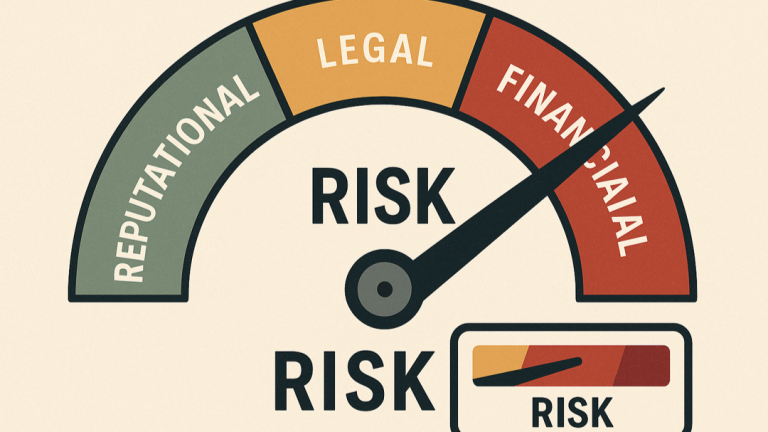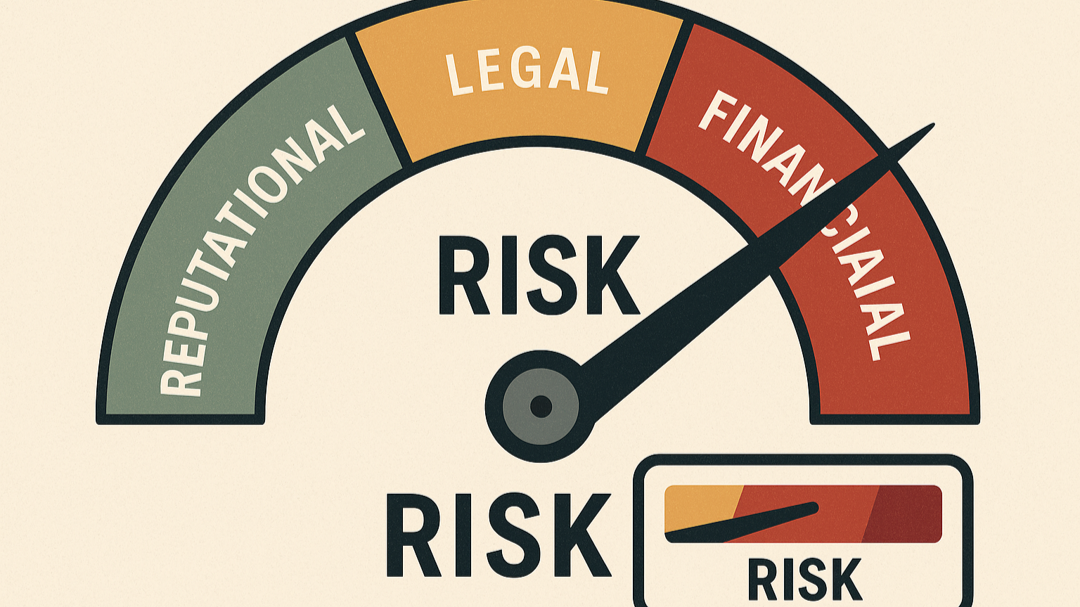Top 5 Compliance Failures in SA Companies & Their Risks
In this new article, brought to you by Duja Consulting, we examine the Top 5 Compliance Failures in South African Companies and the severe legal, financial, and reputational consequences that follow.
📝 Data Protection
⚖️ B-BBEE Fronting
👷 Labour & Equity Shortfalls
🌍 Environmental & Safety Risks
📉 Governance Gaps
Read it now and see why proactive compliance is a business essential, not a tick-box exercise.

Top Five Compliance Failures in South African Companies – And Why They Matter
South African companies face an increasingly complex web of laws and standards – and many are falling short. Compliance failures are not just bureaucratic slip-ups; they carry serious legal, financial, and reputational risks. Regulators are intensifying enforcement – the Financial Sector Conduct Authority (FSCA), for example, imposed nearly R943 million in fines in 2023/24 (up from ~R100 million the year before) amid efforts to address deficiencies like anti-money laundering weaknesses. Below we examine the top five compliance areas where South African organisations (public and private) are most often failing, why these lapses are so common, and what consequences they bring.
1. Data Protection and Privacy Compliance
With the Protection of Personal Information Act (POPIA) now fully in force, many companies are struggling to safeguard personal data. Common failures include inadequate cybersecurity, not obtaining proper consent for data use, and poor data breach response. These failures are prevalent partly because POPIA compliance is new and complex, and some businesses underestimated the effort and cultural change required. Additionally, a surge in cybercrime puts extra pressure on data security practices.
Consequences: The stakes are high. The law provides for hefty administrative penalties – up to ZAR 10 million – for non-compliance, and even criminal liability in certain cases. Offending organisations face civil lawsuits by affected individuals and orders to stop processing data. The reputational damage from a breach can be even more costly: loss of customer trust and goodwill, damaged investor confidence, and operational disruption. In short, failing POPIA compliance exposes companies to fines, lawsuits and an erosion of public trust.
2. Broad-Based Black Economic Empowerment (B-BBEE) Compliance
South Africa’s B-BBEE laws aim to drive transformation, but many firms treat B-BBEE as a mere tick-box exercise. Superficial compliance – for example, appointing token black shareholders or directors without real influence – remains a problem. In worse cases, companies engage in fronting (misrepresenting their empowerment status), which is outright fraud. These compliance failures persist because B-BBEE regulations are complex and often seen as costly or “optional” when enforcement seems lax. Some companies focus on short-term costs over long-term benefits, ignoring that genuine empowerment can enhance innovation and market access.
Consequences: The cost of non-compliance far outweighs the effort of doing B-BBEE right. Firms with poor B-BBEE ratings lose out on lucrative government and corporate contracts, as procurement policies increasingly prefer compliant suppliers. They also suffer reputational harm, appearing uncommitted to South Africa’s equity goals. If a company is caught fronting or willfully flouting the Act, penalties are severe: fines up to 10% of annual turnover and executives can face up to 10 years’ imprisonment. Moreover, convicted offenders may be barred from doing business with government for 10 years. In short, failure in B-BBEE compliance can mean forfeiting market opportunities and facing legal sanctions – a lose-lose scenario.
3. Labour Laws and Employment Equity Compliance
Employee-related compliance failures are another common pitfall. South Africa’s labour framework – from the Basic Conditions of Employment Act (governing working hours, wages, etc.) to the Employment Equity Act (EEA) – is robust, yet enforcement data shows many companies falling short. Some firms fail to pay minimum wage or overtime, ignore unfair dismissal procedures, or neglect to file mandatory employment equity plans. Employment equity non-compliance is especially prevalent; progress in diversifying management remains slow, with women and black South Africans underrepresented in many boardrooms. These failures often stem from a lack of commitment at top levels, insufficient HR capacity, or viewing labour rules as red tape. Smaller businesses, in particular, may find compliance daunting without expertise.
Consequences: Breaching labour laws invites fines and legal action. The Department of Employment and Labour can impose penalties or take non-compliant companies to the Labour Court. For instance, failing to meet EEA requirements can result in substantial fines (in serious cases, up to several percentage points of annual turnover). As one analysis notes, non-compliance with employment equity can lead to fines and legal consequences, underscoring the need to invest in proper HR compliance measures. Beyond direct penalties, companies risk labour disputes, strikes, and productivity losses if they disregard fair employment practices. Non-compliance also harms a company’s reputation as an employer, making it harder to attract and retain talent. Simply put, cutting corners on labour compliance can cost far more in lawsuits, disruptions, and brand damage than it would to comply in the first place.
4. Environmental and Occupational Health & Safety (EHS) Compliance
Environmental regulations and workplace health & safety laws present major compliance challenges across industries. Many organisations have been found violating environmental permit conditions, exceeding emission limits, or mismanaging hazardous waste. Likewise, workplace safety compliance is often inadequate – from factories failing to maintain safe machinery to construction sites neglecting proper training and protective equipment. These failures are prevalent because implementing full Environmental, Health & Safety (EHS) programmes can be costly, and in the past, enforcement was uneven. Some companies have historically gambled that infractions would go unnoticed, or they prioritised profit over safety and sustainability. However, that landscape is changing as the government and public become less tolerant of EHS lapses.
Consequences: Non-compliance in EHS can be devastating. Environmentally, firms face regulatory fines and orders to halt operations until issues are fixed. A notable example is Sasol, fined $1.4 million (around R24 million) in 2020 for environmental non-compliance. Besides fines, there’s the risk of lawsuits (from communities or activists) and irreparable reputational damage if a company is seen as a polluter. In the realm of safety, consequences can quite literally be life-and-death. Serious safety breaches can lead authorities to issue prohibition notices shutting down facilities until hazards are addressed (as happened with one manufacturer where 14 urgent safety stop-orders were served). If accidents occur – a mine collapse, factory fire, or worker injury – companies may face legal liability, compensation claims, and even criminal charges against executives for negligence. New amendments to the Occupational Health and Safety Act are introducing stiffer on-the-spot fines (e.g. R50 000 per infraction) to ensure there are “direct consequences” for non-compliance. Ultimately, EHS failures can result in production shutdowns, massive financial losses, and loss of trust among employees, customers, and regulators. In today’s ESG-conscious world, no organisation can afford to treat environmental and safety compliance as an afterthought.
5. Corporate Governance and Ethical Compliance
High-profile corporate scandals in South Africa – from private-sector frauds like Steinhoff to governance collapses at state-owned enterprises – highlight how ethical and governance compliance failures can cripple organisations. Common failures include poor internal controls, lack of board oversight, tolerance of conflicts of interest, and weak anti-fraud/anti-corruption measures. In some cases, executives override risk and compliance functions entirely, creating a culture where misconduct can flourish unchecked. These issues are often rooted in toxic corporate culture or “tone at the top” problems, where profit and loyalty are valued over integrity. Additionally, rapid growth or complex operations can outpace governance structures, leaving gaps that bad actors exploit. In the public sector, procurement fraud and contract irregularities have been rife, while in private companies, pressure to meet targets sometimes leads to cooking the books (as in Steinhoff’s case of falsifying profits). South Africa’s FATF greylisting in 2023 for deficiencies in anti-money laundering controls further exposed how governance lapses (especially in financial institutions) had broader national impact.
Consequences: The consequences of governance failures are often catastrophic. As the Chair of the King Committee noted, “corporate governance failures can be fatal” – and Steinhoff is a cautionary tale. Once a Top-40 JSE company worth $22 billion, Steinhoff’s empire unravelled in 2017 amid fraud revelations; the company lost 97% of its market value (over $21 billion) in about 18 months, and its executives now face criminal charges. This collapse illustrates how fraud and oversight failures can destroy even a giant firm, wiping out shareholder value and jobs. More broadly, companies with corrupt or negligent governance face regulatory penalties (fines, license suspensions), civil litigation (shareholder and creditor lawsuits), and an exodus of investors and business partners who simply won’t trust the leadership. Once a company’s ethical reputation is tarnished, it’s very hard to win back confidence – as seen in audit and consulting firms that lost clients after being implicated in state capture schemes. In summary, neglecting corporate governance and ethics isn’t just a compliance issue – it’s an existential threat. Robust governance frameworks (like King IV) and proactive ethics compliance are essential to prevent “fatal” failures and ensure long-term sustainability.
Conclusion – Protect Your Business by Prioritising Compliance
Across these five areas, the pattern is clear: compliance is not a nice-to-have, but a fundamental business imperative. The failures outlined – in data privacy, transformation, labour standards, EHS, and governance – all underscore how non-compliance can cripple a company’s operations and reputation. Importantly, these risks are interconnected. A lapse in one area often snowballs into others (for example, a governance failure can lead to fraud, which then creates tax and legal compliance issues).
Yet, achieving full compliance is easier said than done. South African businesses must navigate hundreds of applicable laws and regulations – in fact, “over 220 pieces of legislation” can impact a given company, making the process seem overwhelming. The good news is that no organisation has to tackle this alone. With the right compliance partner and expert guidance, companies can turn compliance from a pain point into a source of strength.
Duja Consulting specialises in compliance and risk governance solutions that help businesses identify gaps, implement effective controls, and foster a culture of ethical compliance. Whether it’s conducting compliance audits, training staff, or designing robust risk management systems, our experts can help you navigate the maze of regulations confidently and efficiently. Don’t wait for a costly scandal or fine to be your wake-up call. Contact Duja Consulting today to fortify your organisation’s compliance framework – and secure your business’s legal safety, reputation, and success for the long term. Your stakeholders, employees, and customers deserve nothing less than the assurance of a compliant and ethically run enterprise.










